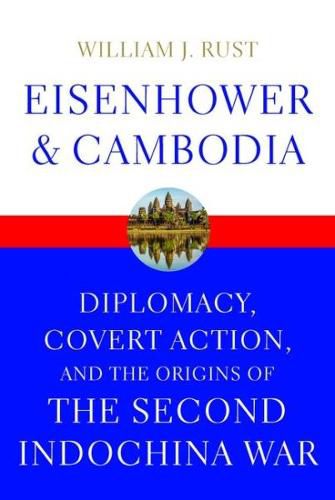Readings Newsletter
Become a Readings Member to make your shopping experience even easier.
Sign in or sign up for free!
You’re not far away from qualifying for FREE standard shipping within Australia
You’ve qualified for FREE standard shipping within Australia
The cart is loading…






This title is printed to order. This book may have been self-published. If so, we cannot guarantee the quality of the content. In the main most books will have gone through the editing process however some may not. We therefore suggest that you be aware of this before ordering this book. If in doubt check either the author or publisher’s details as we are unable to accept any returns unless they are faulty. Please contact us if you have any questions.
Although most Americans paid little attention to Cambodia during Dwight D. Eisenhower’s presidency, the nation’s proximity to China and the global ideological struggle with the Soviet Union guaranteed US vigilance throughout Southeast Asia. Cambodia’s leader, Norodom Sihanouk, refused to take sides in the Cold War, a policy that disturbed US officials. From 1953 to 1961, his government avoided the political and military crises of neighboring Laos and South Vietnam. However, relations between Cambodia and the United States suffered a blow in 1959 when Sihanouk discovered CIA involvement in a plot to overthrow him. The coup, supported by South Vietnam and Thailand, was a failure that succeeded only in increasing Sihanouk’s power and prestige, presenting new foreign policy challenges in the region. In Eisenhower and Cambodia, William J. Rust examines the United States’ efforts to lure Cambodia from neutrality to alliance. He conclusively demonstrates that, as with Laos in 1958 and 1960, covert intervention in the internal political affairs of neutral Cambodia proved to be a counterproductive tactic for advancing the United States’ anticommunist goals. Drawing on recently declassified sources, Rust skillfully traces the impact of plausible deniability on the formulation and execution of foreign policy. His meticulous study not only reveals a neglected chapter in Cold War history but also illuminates the intellectual and political origins of US strategy in Vietnam and the often-hidden influence of intelligence operations in foreign affairs.
$9.00 standard shipping within Australia
FREE standard shipping within Australia for orders over $100.00
Express & International shipping calculated at checkout
This title is printed to order. This book may have been self-published. If so, we cannot guarantee the quality of the content. In the main most books will have gone through the editing process however some may not. We therefore suggest that you be aware of this before ordering this book. If in doubt check either the author or publisher’s details as we are unable to accept any returns unless they are faulty. Please contact us if you have any questions.
Although most Americans paid little attention to Cambodia during Dwight D. Eisenhower’s presidency, the nation’s proximity to China and the global ideological struggle with the Soviet Union guaranteed US vigilance throughout Southeast Asia. Cambodia’s leader, Norodom Sihanouk, refused to take sides in the Cold War, a policy that disturbed US officials. From 1953 to 1961, his government avoided the political and military crises of neighboring Laos and South Vietnam. However, relations between Cambodia and the United States suffered a blow in 1959 when Sihanouk discovered CIA involvement in a plot to overthrow him. The coup, supported by South Vietnam and Thailand, was a failure that succeeded only in increasing Sihanouk’s power and prestige, presenting new foreign policy challenges in the region. In Eisenhower and Cambodia, William J. Rust examines the United States’ efforts to lure Cambodia from neutrality to alliance. He conclusively demonstrates that, as with Laos in 1958 and 1960, covert intervention in the internal political affairs of neutral Cambodia proved to be a counterproductive tactic for advancing the United States’ anticommunist goals. Drawing on recently declassified sources, Rust skillfully traces the impact of plausible deniability on the formulation and execution of foreign policy. His meticulous study not only reveals a neglected chapter in Cold War history but also illuminates the intellectual and political origins of US strategy in Vietnam and the often-hidden influence of intelligence operations in foreign affairs.